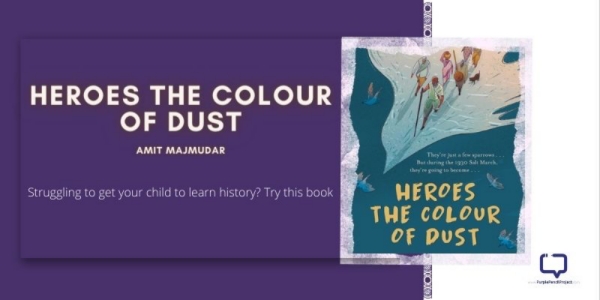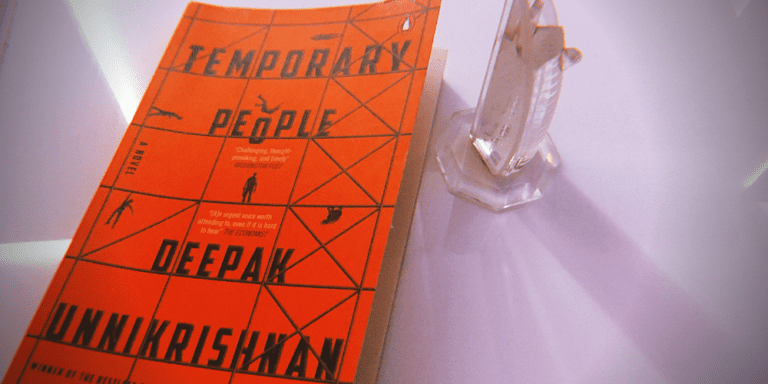Sons of Darkness carries a soul that sings truly to its name. It abounds a darkness that subsumes all: deity or demon. An extensive retelling of Mahabharata, that great Hindu epic that’s been a fodder for authors every decade, Sons of Darkness is filled with characters who are either hiding something or tinkering with ethics.
Author Gourav Mohanty has tossed the characters of Mahabharata into an unknown world where everyone is out for everyone’s blood. The powers that puppet the characters of Sons of Darkness into a grotesque dance can be broadly clubbed into either revenge or ambition. If character A is not baying for B’s blood, B is ready to chop off A’s head and toss it down to turn it into a rung of a ladder that will take them to the moon of their want. This is what everyone hungers for in this blood-soaked universe of Mahabharata: either a gleaming moon or the head of their enemy (this enemy could be a minor, teeny-weeny opponent standing in the path to progress.)
A Slice of Mahabharata for Everyone
The story begins with the siege of Mathura where Krishna calls the shots. After the murder of Kamsa, he put his father on the throne but he manipulates the council of ministers into doing what he wants.
Satyabhama, his warrior queen was betrothed to Shishupal, who’s in service of Jarasandh, the formidable ruler of Magadh whose daughter was wedded to Kamsa. He’s sworn to exact revenge upon Krishna. Then there are Pandavas and Kauravasa, Shakuni and Karna, Duryodhan and Eklavya, Mati and Draupadi, everyone either playing a hand or getting played by other players.
The book has a fine prologue, featuring Muchuk Und who was originally tricked by Krishna into torching Jarasandh (I have read my share fair share of Amar Chitra Katha.) What Krishna does to Draupadi to put her off Karna is straight off a psychiatrist’s house of horrors. The reveal of Yaksha of Gowardhan took me by surprise. The demon Karna’s hiding inside was interesting to read about. I, however, had somehow guessed the fate of Sudama. The dynamics between Arjuna and Draupadi are colder than ice shelves of Arctic and it was a refreshing change to see the author snubbing a legendary love story.
True to its origin, the characters are all morally grey. There is no space here for a hero in a shiny armour. Krishna, otherwise a benevolent god, is a scheming senator. Lady Radha is a powerbroker who hates him to the core. Satyabhama is a bloodthirsty warrior, rearing a fearsome army of orphaned girls. Mati is a promiscuous pirate princess from Kalinga who has no qualms in sleeping around.
The book has some interesting sequences. The swaymvar of Draupdi and the fall of Mathura are the finest. However, I found the blurb of the book similar to another novel so I feel Mohanty has a very good eye, picking up what he likes from what he reads and weaving into the world where his characters live.
People are Human. Even the Gods in Sons of Darkness
In the world of betrayal and killings, Mohanty does carve out some tender moments for his characters. I never thought I would be team Shishupal. Karna (He was stiff and disciplined, with a jaw as unmovable as a mountain. Worst of all, he had some sort of immunity to winking and bribery) is anyway an empath fodder but Mohanty portrays him with a sackful of compassion, one for each shoulder.
Akrur, presented as a minor character, made my eyes prickle, perhaps even more than Satyabhama. While she was a warrior, he was just an ordinary, paunchy noble trying to reclaim the night. Mati, portrayed as a philanderer, is also plenty humanised.
Read on: ‘She had never thought much about love till then. One could thirst for coin, glory or love, but could only possess two of them. And for her lovers were like servants, plentiful and easily forgotten. But just when she was surest of her imperviousness, love crept on her like an assassin, lurking under the table of documents, tariff sheets and contracts over which she and the Northerner discussed freight, levies and bribes.’
But is this an original?
Every good writer is an excellent thief, said TS Eliot.
Stealing is an art and a soul-sister of inspiration. There are perhaps six or seven original stories in the world and everything else is just writers working their way around the words.
Mohanty is an ardent follower of George R R Martin and it shows in the book. Some reviews point out glaring similarities between the book and the works of Abercrombie but since I haven’t read the latter, I can’t comment on that. Some parts of the book felt quite derivative. In a reader who’s not new to the world of speculative fiction in general and grimdark in particular, they evoke a feeling of I-Have-Read-It-Somewhere. Déjà vu comes and goes.
Derivative Sons of Darkness could be but one can’t accuse it of being boring. That’s a crime Mohanty steers clear of. So you might find a squeamish griffin here, reminiscent of dragons who had reduced to the size of a dog when the mighty House Targaryen fell, you might find a hundred other references, but what you won’t find is boredom.
Read this if you want to have some mighty good time.





















